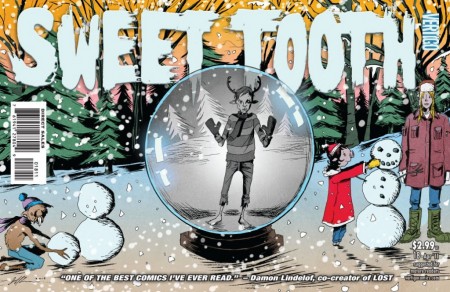Images & Words – Sweet Tooth #18
[images & words is the comic book pick-of-the-week at OL. equal parts review and diatribe, the post highlights the most memorable/infuriating/entertaining book released that wednesday]
Have you ever loved a series? Not enjoyed or flirted with, but truly loved a series? If you have, you’ll know it.
When you’re enamored of a narrative, the viewing of every episode isn’t just a desire, but a gahddamn need. After all, if the L-word’s being tossed around then you’ve become personally invested. Characters are no longer the fabrications of creators, but representatives of your own struggles. As symbols that have entrenched themselves within your own imagination, the characters are not caricatures, but as archetypal placeholders.
At that point, it’s not just about entertainment. It’s also about self-discovery.
What brings about this rumination? A cold brew and the realization that I’m in love with Sweet Tooth.
Like its predecessors, the newest issue of Sweet Tooth manages to produce fuzzy-tingles in both my heart and brain-bone. The series satiates my intellectual hunger by including shared dream experiences, government experiments, allusions to the biblical end times, and subplots that keep me guessing. Jeff Lemire is most certainly capable of constructing a sound structure on which a tale can be presented.
With that being said, the real reason I keep reading is because every time I pick up an issue my heart gently weeps. In the post-apocalyptic ruins, Tommy Jeppard and Gus have lost everything – including each other. Jeppard shoulders the burden of feeling responsible for the loss of his wife, child, and the wide-eyed hickboy with antlers that he had taken under his wing. Gus feels like shit because his dad caught the plague, and then Jeppard handed him over to the scientists at the hybrid preserve. Double-whammy.
And while both of these characters have been dragged through the mud, they don’t quit. Sure, Jeppard’s more withdrawn and brooding than ever, but he’s leading a rag-tag crew to Alaska in the hopes of finding answers. Gus, though unwilling to fully embrace his former paternal figure, continues on with a commendable optimism.
As a stand-alone, Sweet Tooth #18 can be looked at as a condensed illustration of the characters’ current dispositions – recapping the events of the series and showing the posse just trying to get along. Gus and Jeppard don’t speak. Hell, Jeppard tries to make amends by returning Gus’ childhood picturebooks, but he’s rejected. Brutally. The antler-boy turns his back and declares, “That’s kid stuff. And don’t call me Sweet Tooth.” In essence, Gus has forsaken his youth and all of the innocence, purity, and wonder that comes with it. In a moment of heartache, Jeppard stands alone in a gray panel, realizing just how bleak things have become.
In a more action-oriented scene, Lucy comes close to killing Dr. Singh. She figures that it’s just payment for the atrocities he put her (and countless others) through in the hopes of finding a cure for the plague. But cooler minds prevail and the group continues on without any fatalities.
Fortunately, Lemire makes sure to insert enough levity to maintain the uncanny idealism of the series. An adorable friendship is formed, with Johnny looking out for hybrid Bobby – in an especially endearing moment, he puts a winter cap on the kid’s head and calls him “Chewie.” Oh, and there’s also the fact that the comic ends with a snowfall that sees the hybrids building forts, hucking snowballs, and constructing forts.
They all laughed and smiled. The Boy looked over and even thought he saw a smile on The Big Man’s face…but it was so bright out he couldn’t be sure.
There’ll always be silver linings to black clouds. Moments worth living for. Even at the end of the world.
Also worth mentioning is the fact that this comic is sideways. That’s right, Sweet Tooth #18 is printed calendar style. Additionally, although Lemire does use some standard panel layouts, he employs large pictures and separate sections of text throughout much of this edition. In fact, one might argue that this format is similar to a child’s picturebook – just like the one that Gus would no longer accept!
Since that act of abandonment deflates the reader, Lemire may be suggesting that comics are our opportunity to hold onto that which Gus throws away.
Astonishment. Possibility. Hope.
Considering both the story and its execution, Sweet Tooth #18 is a genuinely novel comics experience. Once again, my belief that Jeff Lemire is going to do some incredible things for the medium has been reaffirmed. If you haven’t, you need to hop aboard this train.
Now, for your amusement, a terrible pun. In hypertext!!!




